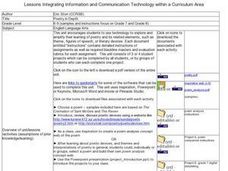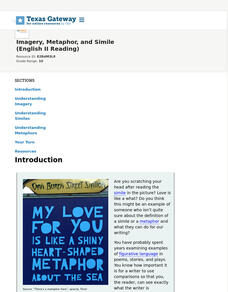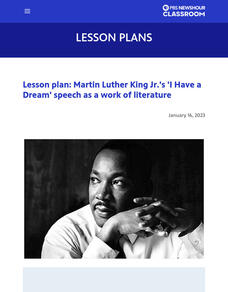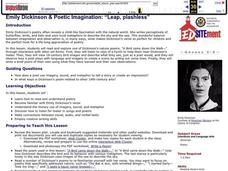Curated OER
Snowy Similes
The class defines similes after creating a KWL chart about them. Groups rotate through a series of stations in which they creatively complete similes. They create a picture booklet that contains similes. However, the booklet topic and...
Curated OER
Poetry in Depth
Scholars use technology to explore poetry and its related elements, such as theme, figures of speech, and other literary devices. They complete four poetry projects including a poem analysis with a concept web, an interactive poem...
Curated OER
Edward Lear, Limericks, and Nonsense
Introduce your class to the delights of nonsense poetry and explore literary devices with the writing of Edward Lear. Learners identify rhyme and meter as well as figures of speech, alliteration, and onomatopoeia in "The Owl and the...
Curated OER
Carl Sandburg's "Chicago": Bringing a Great City Alive
Students examine the historical and cultural context in Sandburg's poem. The poetic devices of personification and apostrophe are utilized in the poem and identified by Students.
K12 Reader
Proverbs and Adages: What’s the Meaning?
Your kids have probably heard these idioms before, but do they know what they mean? Help them learn that haste makes waste, an ill wind blows no good, and that ignorance is bliss with a list of popular expressions.
Curated OER
Similar Similes
Investigate with your class how similes are figures of speech that use the words as and like as visual terms. They use this knowledge to complete a worksheet where they write some similes of their own. Be sure to download the attached...
K12 Reader
Proverbs and Adages: What Do They Mean?
You shouldn't judge a book by its cover, but feel free to find the silver lining in a activity about common proverbs and adages. Learners read six popular adages and write their literal definitions on the lines provided.
Curated OER
Revision
Young poets learn the value of using a thesaurus when crafting and revising poems. They examine poems rich in figurative language and then a revised version with the figurative language removed. To demonstrate what they have learned,...
Curated OER
The Language of Surprise
Aspiring writers complete and discuss fill-in-the-blank cliché expressions, define cliché as a form of predictable writing, take cliché expressions and turn them into new, unpredictable ones, read poetry that illustrates writer's use of...
K12 Reader
Warm Up to Alliteration!
How can you tell if a sentence has alliteration? Use a short worksheet to help kids identify examples of alliteration, complete sentences to create alliteration, and use nouns to write their own alliterative sentences.
Curated OER
Short Poems Are Scary!
What do all those chairs and pencils do in the classroom once everyone leaves? Allow imaginations to run wild with frighteningly short poems!
K12 Reader
Finish the Proverbs and Adages
How many common idioms do you know? Test your knowledge with a set of ten phrases to complete. The idioms range in difficulty level, making it a good challenge for even advanced readers.
Desire2Learn
Alliteration Worksheet
Learners love literary lyrics! Practice alliteration with an activity that encourages kids to find a line of alliteration for every letter of the alphabet. After they finish, they can create a line of their own alliteration and explain...
E Reading Worksheets
Poetic Devices Finder
Track the poetic elements in any text with a guided reading worksheet. Kids note examples of consonance, alliteration, onomatopoeia, repetition, rhyme, and rhythm when reading a poem or story, and provide a short explanation as to why...
Novelinks
The View From Saturday: Concept/Vocabulary Analysis
Design your unit on The View From Saturday by E.L. Konigsburg with a concept and vocabulary analysis resource. It outlines the plot, literary elements, vocabulary issues, and any possible considerations for planning a differentiated...
Poetry4kids
How to Write an Exaggeration Poem
The best poetry writing lesson of all time is here for you! Learn all about the art of exaggeration with a lesson on exaggeration poems, which instructs students to use wild imagery to convey their message.
Texas Education Agency (TEA)
Imagery, Metaphor, and Simile (English II Reading)
The sixth interactive in this series introduces learners to the power of figurative language. After studying examples of similes and metaphors, readers examine how such comparisons help them see through a writer's eyes. Interactive...
Curated OER
Understanding King's Use of Metaphors in the
One of the most famous and well-crafted speeches of all time, Dr. Martin Luther King, Jr.'s "I Have a Dream" speech, consists of rich metaphors and rhetorical language. Using a provided graphic organizer, students analyze five quotes...
PBS
Dr. Martin Luther King Jr.’s ‘I Have a Dream’ Speech as a Work of Literature
To appreciate the oratory of Dr. Martin Luther King Jr.'s "I Have a Dream" speech, scholars examine the rhetorical devices and influences that make the speech so famous. They examine background information, conduct a close reading of the...
Curated OER
Poetry Writing Unit: Writing a Film Poem
Film poems? To concluded a poetry unit, writers select one of their own poems and create a film that brings to life the sounds and images of their work. Included with the detailed unit plan are daily lessons, student examples, a list of...
Curated OER
A Seashell Lesson: Writing for Detail and the Scientific Process
Practice descriptive language in this lesson, which prompts elementary and middle schoolers to write detailed descriptive sentences describing a seashell. They write a description of a shell, create an illustration, and other students...
Curated OER
Practice Book O
Whether you need resources for reading comprehension, literary analysis, phonics, vocabulary, or text features, an extensive packet of worksheets is sure to fit your needs. Based on a fifth-grade curriculum but applicable to any level of...
Curated OER
"Leap, Plashless": Emily Dickinson & Poetic Imagination
Students read and explore one of Emily Dickinson's nature poems, "A Bird Came Down the Walk-" through interaction with a variety of art forms. Clips of a hymn to hear meter and the viewing of bird images exposes them to the language and...
Curated OER
Figurative Language-Part 1
Students explore figurative language. In this figurative language lesson, students look up, define, and give examples of a list of literary terms.
Other popular searches
- Figurative Language Poetry
- Figurative Language in Poems
- Figurative Language Quiz
- Figurative Language Project
- Imagery Figurative Language
- Figurative Language Lessons
- Using Figurative Language
- Figurative Language Worksheets
- Figurative Language Test
- Figurative Language in Poetry
- Figurative Language Vocabulary
- Figurative Language in Prose

























